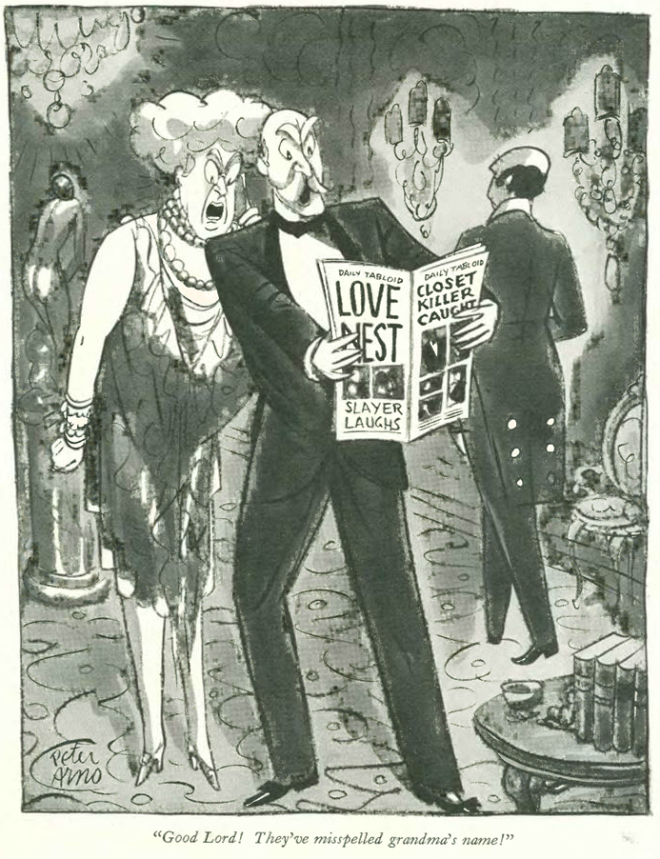One of the challenges in researching old New Yorker magazines is the frequent use of pseudonyms or simple initials at the end of columns and reviews. With enough digging one can usually determine the nom behind the plume.

Such is not the case with The New Yorker’s film critic of the late 1920s, who signed reviews “O.C.” It would be good to know a little about this person, since he or she held strong opinions about the condition of American cinema. I will continue to dig.
O.C.’s review in the April 7, 1928 issue concerned the release of We Americans, a film based on a Broadway play of the same name. Directed by Edward Sloman, it focused on the trials and tribulations of three first-generation American families: The Jewish Levines, the German Schmidts and the Italian Albertinis. The film followed each family through trial, tribulation and sacrifice as they left behind the Old World and joined the great “Melting Pot.”
In one of the storylines, the Levines lose a son, Phil, to the wartime trenches of France. In losing his life, Phil saves the life of the socially prominent Hugh Bradleigh, who in the end falls in love with Phil’s sister, Beth. In the film’s sentimental ending, the Levines and the Bradleighs meet one another for the first time at the wedding of Hugh and Beth.

Yes, this picture got under the reviewer’s skin. Now for the coup de grace:
Over in the book review section, Dorothy Parker was also experiencing heartburn over the latest work of that all-American man of letters, Sinclair Lewis.


Now that Parker had our attention regarding her misgivings of the future Nobel Laureate, she abandoned the polite prose and went in for the kill:


Wooden as the plaque itself
The New Yorker’s Charles Lindbergh watch continued, this time at a ceremony during which the Woodrow Wilson Foundation presented its medal and $25,000 prize to Lindbergh for his “contributions to international friendship” (in retrospect an ironic award, since Lindbergh would later become the spokesman for isolationism during the fascist terrors of the 1930s). The ceremony was a dull affair, but thanks to the magic of media it no doubt looked like a jolly time…
An invention from the late 1890s, piano rolls proved to be a popular diversion in the 1920s, so popular in fact that they warranted a regular review in The New Yorker, along with records and sheet music:


* * *
Our Advertisers
One of the more curious series of advertisements to appear in the early New Yorker were these from the Chicago Tribune. Shameless in their boosterism, these ran during the editorship of Col. Robert R. McCormick, who was strongly associated with old right-wing politics and isolationist movements. The Tribune’s motto at this time was “The American Paper for Americans.”
 Another ad that caught my eye was this one for Johnnie Walker cigarettes…I guess you’d better listen when a giant hand reaches down from the heavens and taps you on the shoulder. I love the resigned look on the face of his companion: “Oh dear, it’s that dreadful hand again…”
Another ad that caught my eye was this one for Johnnie Walker cigarettes…I guess you’d better listen when a giant hand reaches down from the heavens and taps you on the shoulder. I love the resigned look on the face of his companion: “Oh dear, it’s that dreadful hand again…”
 And finally, our cartoon, courtesy Peter Arno…
And finally, our cartoon, courtesy Peter Arno…
 Next Time: Will Wonders Never Cease?
Next Time: Will Wonders Never Cease?






The voice of “O. C.” sounds like that of Sid Perelman, but I did not think he had begin to write for The New Yorker as early as this. It does not really sound like Thurber (a little too nasty). It certainly does not sound like White. Possibly Wolcott Gibbs? Again, the dates do not seem to line up. Let us know if you figure it out!
LikeLike
Thanks for reading and commenting, Frank. I think you are correct in assuming that “O.C.” is a pseudonym rather than someone’s actual initials. I will write the New Yorker and ask an archivist to look this up.
LikeLike